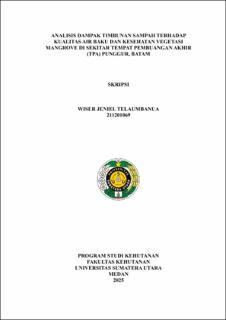| dc.description.abstract | Population growth and industrial activity in Batam City have led to an increase in waste volume, much of which is disposed of at the Telaga Punggur Landfill. The open dumping system at this landfill has the potential to produce leachate that pollutes the environment, including water bodies potentially used as raw water and the surrounding mangrove forests. This study aims to analyze the impact of waste accumulation at the Punggur TPA on the quality of raw water and the health of the surrounding mangrove forest vegetation. The study was conducted in November 2024 using a water sampling method at three points (upstream, middle, and downstream) through the grab sampling technique. The water quality parameters measured included temperature, odor, pH, salinity, Biochemical Oxygen Demand (BOD), Chemical Oxygen Demand (COD), and heavy metals (Pb and Zn). In addition, the health condition of the mangrove vegetation was assessed using the Forest Health Monitoring (FHM) method based on the type and severity of vegetation damage. The study results showed that several water quality parameters, such as BOD, COD, and heavy metal content, exceeded the quality standards according to PP No. 22 of 2021, especially in the upstream and middle areas. The spatial distribution of pollution showed a higher concentration pattern around the TPA. Regarding vegetation, various types of damage were found, such as pest attacks, leaf spots, broken stems, and termite nests, which reflect a decline in the health of the mangrove ecosystem. This study indicates that activities at the Punggur TPA have a significant negative impact on the quality of raw water and the health of mangrove vegetation in the study area | en_US |


